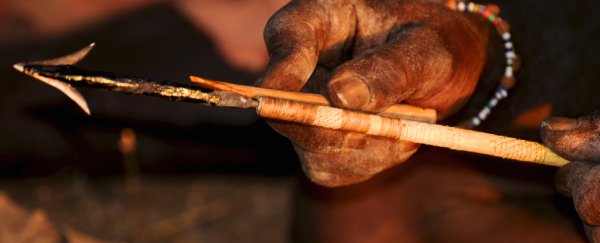There's no shortage of scientific research trying to find an effective, safe version of the pill for men, but we doubt any existing drug candidates have a history as deadly and fearsome as this new discovery.
Scientists have identified a chemical that could be suitable for a male contraceptive pill in a plant extract that African warriors and hunters traditionally used as a heart-stopping poison on their arrows.
A team of researchers from the University of Minnesota and the University of Kansas say ouabain, a toxic substance derived from two kinds of African plants – and also produced in mammals in lower amounts – could serve as the basis for a working male pill.
In its original form, ouabain is found in the roots, stems, leaves, and seeds of the Acokanthera schimperi and Strophanthus gratus plants from eastern Africa – a discovery ancient Ethiopian warriors made more than two millennia ago.
Much like their Kenyan, Tanzanian, Rwandan, and Somali counterparts, Ethiopian hunters and warriors would extract the poisonous substance by boiling the plant over a fire, and dip their arrow tips into the concentrated liquid that remained.
Fast-forward a couple thousand years, and European scientists in the 18th century discovered the extract acted as a cardiac glycoside – a compound that can increase the force of heartbeats while decreasing their rate of contractions.
Because of that, in very low doses, ouabain has been used previously to treat conditions like hypotension and arrhythmia, although it's still considered a hazardous substance, and is not currently approved for use in the US.
Nonetheless, this dangerous poison could be about to make a medical comeback – at least in a newly tweaked, safe form – thanks to the extract's potential to affect male fertility.
Previous studies have shown that ouabain can curb fertility in men, but because of the substance's capacity to play havoc with our hearts, it's never been considered safe enough to use as a contraceptive.
Now, the research team has used experiments with male rats to demonstrate that, after tampering with the molecular arrangement of the extract, a modified ouabain analogue can still curb the animals' fertility while being non-toxic, leaving the heart and other bodily systems alone.
By removing a sugar group from the chemical and replacing its lactone group with a triazole group, the ouabain derivative when administered to rats zeroed in on the animals' sperm cells, and reduced the sperms' motility (ability to swim).
It targets the sperm by binding strongly to a subunit on the cells called Na,K-ATPase α4, disrupting sperm motility sufficiently to produce male infertility.
It's a promising result that provides another avenue of research for a human male pill, especially since the research so far suggests the effect is reversible - the motility reduction observed in the animals was not permanent.
We're still a long way from this modified substance being tested on humans, but if future testing delivers equally positive results, that could one day happen – in which case the future of birth control may lie in the poison arrows of the past.
We'll just have to wait and see.
The findings are reported in the Journal of Medicinal Chemistry.
